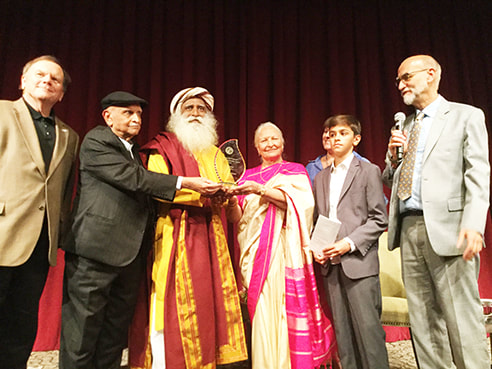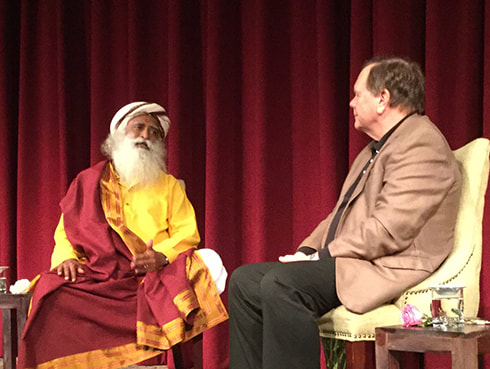
BY KALYANI VASAN
LOS ANGELES, CA -The Doshi Family Annual Bridgebuilder award ceremony for 2018 was held at Loyola Marymount University here on October 15. The event was attended by the LMU fraternity as well as the intelligentsia of the community. This year’s winner: Sadhguru of the Isha Foundation was welcomed by...
LOS ANGELES, CA -The Doshi Family Annual Bridgebuilder award ceremony for 2018 was held at Loyola Marymount University here on October 15. The event was attended by the LMU fraternity as well as the intelligentsia of the community. This year’s winner: Sadhguru of the Isha Foundation was welcomed by...
Pratima and Navin Doshi and in his address, Doshi highlighted the social revitalization projects, education initiatives and the environment through which millions of people have been given the means to overcome poverty, improve quality of life and also create a sustainable earth. Sadhguru’s popularity was obvious in the packed auditorium as well as in the overflow into another auditorium where attendees could watch the event streamed live in real time.
The evening began with a welcome address by Robbin. Crabtree, Dean of the College of Liberal Arts at LMU. In her welcome address, Crabtree expressed that LMU has a tradition of holding this annual event and thanked the Doshis for this honor. The presentation of the award was done by Navin and Pratima Doshi. Christopher Key Chapple, the Doshi Professor of Indic and Comparative Theology, LMU served as the Master of Ceremonies.
The subject of Sadhguru’s keynote lecture was “Earth Sense” and this dialog was facilitated by Terry Tamminen, author and a well - respected authority on energy conservation and environment preservation. Sadhguru highlighted the fact that by 2050 our earth will be a desert if we do not preserve our soil. He talked about his ‘plant a sapling’ drive in the southern state of Tamil Nadu, India that has gained a momentum beyond his imagination. Sadhguru emphasized the importance of soil preservation, soil development and the creation of soil sustainability. Soil, he said is depleting due to centuries of cultivation and the meteoric increase in the human foot print. The answer? Sadhguru had the audience guffawing with laughter when he answered in his characteristic style, “Reduce the number of feet. We are nice but, not that nice!” He stated that three generations of a family living together is lovely but, we now have five generations living under one roof and that is two too many. “When India gained Independence, life expectancy was close to 28 today, it is 65. Yes, that is a good thing that our loved ones are living longer. However, it is only plain logic to put into force the fact that if we are postponing death we should also postpone births!”
Sadhguru advocated a change that needs to occur, a shift in the paradigm of our thought process-from the economy to the weather. When we talk about the economy we are talking about a complex methodology of survival. Somehow our ecology has become tomorrow’s problem and we concentrate on today’s concern-the economy. Ecology determines what we breathe, eat and what kind of soil we walk on. We are conditioned to think that our lives are measured by the fluctuations of the stock market. We think that calamities determine our outcomes, the truth is that human beings are becoming the biggest calamity; we are depleting our ecological gifts at an alarming rate, forgetting that the stock market does not ensure our survival but, our environment does. Mother earth freaks out in the form of earthquakes, floods etc. when we burden her and we call those ‘natural’ disasters. However, we need to remember these disasters are in reality caused by human beings.
Real solutions can only be achieved by serious policy changes especially from a nation such as the US. Nations need to come up with policies that are solutions that do not simply postpone disasters which in turn will affect coming generations. “Right now, individual actions are important to create changes that benefit ecology, but true turn around will come only when nations make changes to existing policies.” Sadhguru then went on to say that soil is the critical element that ensures our existence as well as being a vital part of our death. After all, we turn into soil when we die. To the earth we are just a tiny re-cyclable object, but the earth is the core to our lives and unless we fix our environment we are inviting disasters. The evening was then opened up for questions from the audience and Sadhguru gave answers to some really serious questions with his characteristic humor, candor and wisdom. It was easy to see why Sadhguru and his Isha Foundation now operate in 300 centers, supported by nine million volunteers worldwide. He is a New York Times bestselling author: Inner Engineering: A Yogi’s Guide to Joy, an internationally successful speaker who has been asked to speak at the world’s renown universities such as Yale, Wharton, Stanford among others. Sadhguru’s mission to make the world understand that the soil that we walk on, trample on, dig into, deserves to be respected and preserved is what made the Doshi’s take notice, and honor him with the 2018-Doshi Family Bridgebuilder Award.
The evening began with a welcome address by Robbin. Crabtree, Dean of the College of Liberal Arts at LMU. In her welcome address, Crabtree expressed that LMU has a tradition of holding this annual event and thanked the Doshis for this honor. The presentation of the award was done by Navin and Pratima Doshi. Christopher Key Chapple, the Doshi Professor of Indic and Comparative Theology, LMU served as the Master of Ceremonies.
The subject of Sadhguru’s keynote lecture was “Earth Sense” and this dialog was facilitated by Terry Tamminen, author and a well - respected authority on energy conservation and environment preservation. Sadhguru highlighted the fact that by 2050 our earth will be a desert if we do not preserve our soil. He talked about his ‘plant a sapling’ drive in the southern state of Tamil Nadu, India that has gained a momentum beyond his imagination. Sadhguru emphasized the importance of soil preservation, soil development and the creation of soil sustainability. Soil, he said is depleting due to centuries of cultivation and the meteoric increase in the human foot print. The answer? Sadhguru had the audience guffawing with laughter when he answered in his characteristic style, “Reduce the number of feet. We are nice but, not that nice!” He stated that three generations of a family living together is lovely but, we now have five generations living under one roof and that is two too many. “When India gained Independence, life expectancy was close to 28 today, it is 65. Yes, that is a good thing that our loved ones are living longer. However, it is only plain logic to put into force the fact that if we are postponing death we should also postpone births!”
Sadhguru advocated a change that needs to occur, a shift in the paradigm of our thought process-from the economy to the weather. When we talk about the economy we are talking about a complex methodology of survival. Somehow our ecology has become tomorrow’s problem and we concentrate on today’s concern-the economy. Ecology determines what we breathe, eat and what kind of soil we walk on. We are conditioned to think that our lives are measured by the fluctuations of the stock market. We think that calamities determine our outcomes, the truth is that human beings are becoming the biggest calamity; we are depleting our ecological gifts at an alarming rate, forgetting that the stock market does not ensure our survival but, our environment does. Mother earth freaks out in the form of earthquakes, floods etc. when we burden her and we call those ‘natural’ disasters. However, we need to remember these disasters are in reality caused by human beings.
Real solutions can only be achieved by serious policy changes especially from a nation such as the US. Nations need to come up with policies that are solutions that do not simply postpone disasters which in turn will affect coming generations. “Right now, individual actions are important to create changes that benefit ecology, but true turn around will come only when nations make changes to existing policies.” Sadhguru then went on to say that soil is the critical element that ensures our existence as well as being a vital part of our death. After all, we turn into soil when we die. To the earth we are just a tiny re-cyclable object, but the earth is the core to our lives and unless we fix our environment we are inviting disasters. The evening was then opened up for questions from the audience and Sadhguru gave answers to some really serious questions with his characteristic humor, candor and wisdom. It was easy to see why Sadhguru and his Isha Foundation now operate in 300 centers, supported by nine million volunteers worldwide. He is a New York Times bestselling author: Inner Engineering: A Yogi’s Guide to Joy, an internationally successful speaker who has been asked to speak at the world’s renown universities such as Yale, Wharton, Stanford among others. Sadhguru’s mission to make the world understand that the soil that we walk on, trample on, dig into, deserves to be respected and preserved is what made the Doshi’s take notice, and honor him with the 2018-Doshi Family Bridgebuilder Award.



 RSS Feed
RSS Feed
